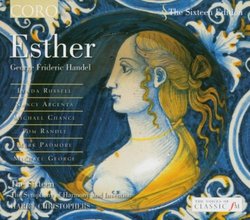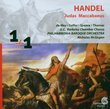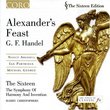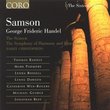| All Artists: George Frideric Handel, Harry Christophers, The Symphony of Harmony, Invention, Nancy Argenta, Michael Chance, Lynda Russell Title: George Frideric Handel: Esther Members Wishing: 0 Total Copies: 0 Label: Coro Original Release Date: 6/1/2004 Release Date: 6/1/2004 Genre: Classical Styles: Opera & Classical Vocal, Chamber Music, Forms & Genres, Sonatas, Historical Periods, Baroque (c.1600-1750), Instruments, Reeds & Winds Number of Discs: 2 SwapaCD Credits: 2 UPC: 828021601927 |
Search - George Frideric Handel, Harry Christophers, The Symphony of Harmony :: George Frideric Handel: Esther
 | George Frideric Handel, Harry Christophers, The Symphony of Harmony George Frideric Handel: Esther Genre: Classical
|
Larger Image |
CD DetailsSimilar CDs |
CD ReviewsA voice teacher and early music fan George Peabody | Planet Earth | 04/04/2006 (5 out of 5 stars) "BIG IDEAS COME IN SMALL PACKAGES Handel began composing the oratorio 'Esther' in 1718, and it was performed in London in 1732. This is one of Handel's most intimate and shorter oratorios, at less than one-hundred minutes, and as a 'filler' on the recording there is included an oboe concerto, between scenes three and four of the composition. Nevertheless the oboe's prominence in this particular work gives a substantial reason for its inclusion. It is presented here in its original 1718 version, performed and recorded "in the round". There is some confusion as to who actually wrote the libretto for it, but the story follows very closely the biblical story of Esther in the Book of Esther in the old testament. The story tells of a plot of Haman, the Agagite (Michael George-bass) jealous and powerful vizier of King Xerses (Ahasuerus-Tom Randle-tenor) of Persia(485-464), to destroy in a single day all the Jews living in the Roman Empire. He is moved to this out of hatred for the Jewish servant Mordecai (Mark Padmore-tenor),who for religious motives refuses to render him homage. The day of the proposed massacre is determined by lot. Meanwhile, Esther,niece and adopted daughter of Mordecai, is chosen Queen by King Xerses. She averts the pogrom planned against her people and has the royal decree of extermination reversed against Haman and the enemies of the Jews. Mordecai replaces Haman, and together with Esther, works for the welfare of their people. As you can see this makes for an interesting Oratorio, which it truly is! This is a "small" contribution compared to many of Handel's other works. However, it is not "small" in a musical sense. There is much creativity on the part of Handel as to orchestral scoring; he exploits his small orchestra and chorus in surprising ways, introducing new vocal and instrumental colours throughout the score, adding and subtracting instruments and voices in many and varied ways. This is a listening surprise as it moves along. And what a great performance on the part of the Christophers as well as some outstanding vocal soloists. Mark Padmore's (Mordecai) aria "Tune Your Harps to Cheerful Strains" was superb as was the Duet between Lynda Russell (Esther) and Tom Randle (Ahasuerus).But the aria that really drew me into the entire drama was sung by Michael Chance (Priest) "O Jordan, Jordan, sacred Tide"; a really memoralble renditio of whtat must be one of Handel's greatest arias. The Chorus is extremely good and dictionally perfect. QUOTATION FROM 'CLASSICAL MUSIC' (CANADA): "The sound of 'Esther', superbly comminicated in the recorded performance here, is pure enchantment...The choral singing has an exceptional grandeur, and the instrumental playing a shimmering beauty. Among the soloists Nancy Argenta and Michael Chance dominate....Both singers affirm a new golden age of Handel interpretation." This disc was recorded in 1995; is beautifully packaged and includes excellent and informative liner notes as well as a complete text." THE SHAPE OF THINGS TO COME DAVID BRYSON | Glossop Derbyshire England | 01/25/2007 (5 out of 5 stars) "Esther is the first of Handel's oratorios by a good many years, written when he was 33 and enjoying the patronage of the Duke of Chandos. When he later became his own impresario and was running into trouble as a composer and producer of Italian operas he turned to oratorio as a strategic alternative, but at this early date his concern was to deliver staged entertainments for the Duke, and Esther, contemporary with the work that later gained the title Acis and Galatea, seems to have been just an unusually serious specimen of its type.
As often with Handel, there is no fully official version of the score, and this particular score may not even be fully complete from any point of view. The libretto seems to have been the work of someone in the frivolously named association of big literary figures called the Scriblerus Club, perhaps Dr John Arbuthnot, dedicatee of Pope's great poetic Epistle, but Pope himself may have had a hand in it too. As we have it here, the work breaks into two very asymmetrical parts. Scenes 1 and 2 start with a recitative lasting only seconds from Habdonah followed by a longer one in which Haman announces his onslaught on the Israelites, and from there on feature only anonymous participants. Esther herself and the other named characters make their appearance first in scene 4, but the change of tone occurs in scene 3. At this point the music gains gravity first in the chorus Ye sons of Israel with its extraordinary modulations and then in the striking aria O Jordan, Jordan. I myself feel that this weightier tone is maintained to the end, whether or not the writer of the liner note is correct in saying that the long final chorus with solos is out of proportion to its context. Throughout - in the first part as well as in scenes 3-6 - the instrumental writing is vivid and varied, with an extraordinary pizzicato accompaniment to Tune your harps and then an even more extraordinary obbligato from the harp itself at Praise the Lord. The harpist is no less than Jan Walters, but sometime I would like to see the score and check out what seem some odd rhythmic interactions here between her and the soloist Nancy Argenta. There are no fewer than ten vocal soloists in a work lasting a little over an hour and a quarter, and a very distinguished bunch they are. I was particularly pleased to find Michael Chance in the countertenor role of the Priest of the Israelites as I admire the strength of his tone, but there is no real weakness among them, unless Lynda Russell as Esther has a couple of very slightly awkward high notes in Flatt'ring tongue, which must be a little nerve-wracking to sing as she has to find her note for herself unaccompanied at the start and later at the reprise. You will see some big names among the instrumentalists too, with Crispian Steele-Perkins on the trumpet making a predictably fine contribution towards the end, and of course with Jan Walters in that marvellous harp part early on. The chorus gets some wonderful work to do, and rises to it fully. I really am unable to worry about the proportionateness of the final chorus when I hear that incomparable Handelian build of tone, sung by 18 singers and sounding as if there were 100. There is a good liner note by Graydon Beeks Jr, not perhaps the last word in lucidity (neither is the plot of the libretto come to that) but worth re-reading. Harry Christophers himself contributes a short foreword largely concerned with the recording process and highlighting the contributions of Mark Brown and Mike Hatch, his long-time technical collaborators. I was interested to see also the name of Geoff Miles in a role described as `editor'. What responsibilities this involved is not stated and perhaps I ought to know without being told, but I know the work of Geoff Miles as recording engineer from elsewhere and it gave me confidence just to see that he is involved in the proceedings, and the technical work is predictably excellent. My collection of Handel oratorios is now almost complete, and what a wonderful musical experience they are. Each is unique in its own way, but Esther is unique in some very special ways, and I suggest that you do not wait until you are my age to get to know it." |

 Track Listings (20) - Disc #1
Track Listings (20) - Disc #1



